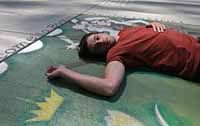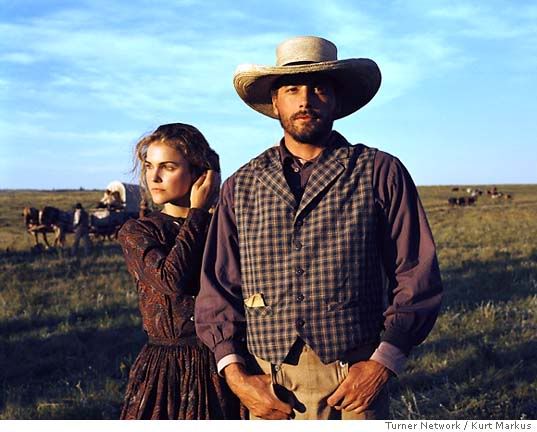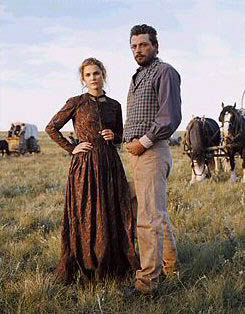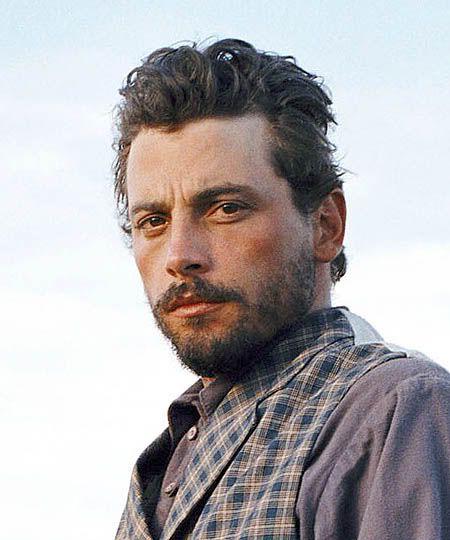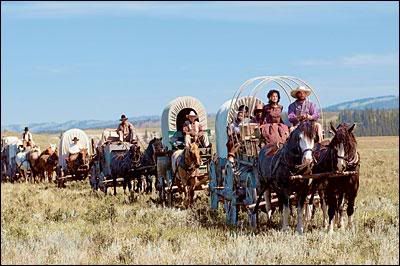Ulrich learns how the West was really won
Having already crafted the definitive Holocaust movie with the Oscar-winning ‘‘Schindler's List,'' Steven Spielberg is now attempting to do the same for Native Americans in his six-part TNT miniseries, ‘‘Into the West.''
What's most impressive about the series, which begins at 8 tonight and will air each of the next five Fridays, is its evenhandedness in telling a story that finds fault not just with the white man, but the Indians themselves, who played an unwitting part in their own genocide.
Covering the final 75 years of the 19th century, ‘‘Into the West'' is ambitious in size and scope, perhaps too ambitious. Running the gamut from wrenching to cliché, it ultimately succeeds on the strength of its star-studded cast.
Among the more than three dozen stars is Skeet Ulrich, the 35-year-old actor best known for his brief but memorable scenes in ‘‘Scream'' and ‘‘As Good as It Gets.'' In ‘‘West,'' he plays the youngest of three Virginia-bred brothers who leave their father's wheelwrighting business to head for points west in the early 1800s.
Like a family of Forrest Gumps, the three Wheeler brothers and their offspring walk us through nearly eight decades of often unflattering U.S. history. And through much of it the Wheeler clan faces a series of calamities, many of which befall Ulrich's Jethro, including a bout of cholera, Indian attacks and a near drowning.
That was nothing, though, compared to the grueling six-month shoot that took place last year in the wilderness of Alberta, Canada.
On a recent visit to Boston, Ulrich admitted it was a challenge, but he wouldn't have changed a minute of it.
‘‘I think it's an amazing experience to tell this story ... to do the American holocaust justice,'' he said. ‘‘Nobody is better than Spielberg at telling the truth and weaving a good story in the midst of it.''
As the executive producer, Spielberg didn't have a direct involvement in writing or directing the six, two-hour episodes. But Ulrich says that doesn't mean he wasn't always on the set in spirit.
‘‘He had a godfather-like presence,'' said Ulrich, looking very un-Hollywood in his T-shirt and jeans. ‘‘You always heard back about the previous day's work ... what he thought of the rushes, what he thought of the script.''
Spielberg also personally cast each of the dozens of actors, from Emmy-winners like Beau Bridges to virtual unknowns like Matthew Settle, who landed the lead role of Jacob Wheeler.
That he was among the chosen ones proved a huge thrill for Ulrich. But that was nothing compared to having his eyes opened to an American tragedy long ignored by the history books.
‘‘Everything to do with the Native American side was not taught to me in school,'' Ulrich said while relaxing in his suite at the Ritz-Carlton Boston. ‘‘The Manifest Destiny, as I remember it, seemed to be a positive thing as the teachers explained it to us. They didn't at all get into the fact that Christianity was saying ‘wipe out everything in the way.' And I don't ever remember reading about the Indian Removal Act. So everything (in the miniseries) was kind of new to me.''
And what did he think of what he gleaned from the script?
‘‘I'm kind of ashamed, to be quite honest; it's not a pretty picture,'' he said of the way the West was won. ‘‘We have a continuing problem with that (mind set) as Americans - as white Americans, certainly - in relation to this story.''
On a more positive note, Ulrich said he enjoyed the chance to reunite with Keri Russell, who played his arranged wife in February's hugely popular Hallmark Hall of Fame flick, ‘‘The Magic of Ordinary Days.''
In ‘‘Into the West,'' the former ‘‘Felicity'' star plays his cousin, Rachel, a young woman who is captured by Indians and becomes the property of a strong but sensitive brave she eventually falls for and starts a family with.
‘‘She's a rarity,'' Ulrich says of his two-time costar. ‘‘She's very levelheaded and uncomplicated in terms of a working environment.''
He said she added to his comfort on the ‘‘Into the West'' set, as did his firsthand knowledge of the 19th-century lifestyle.
‘‘I lived for five years in a house built in 1850,'' says the native Virginian, a nephew of NASCAR star Ricky Rudd. ‘‘Some days I'd wake up and it would be 18 degrees in the house. No heat, no air conditioning, no insulation ... and I chopped my own wood, 12 to 13 cords each winter.
‘‘The first year it was really romantic. The second year it was a real (expletive). Then the third year I was done, I was fed up with it,'' Ulrich said. ‘‘I think our animal instincts were so much more at the surface at that time in history. To have to forage for your food, to have to provide your own shelter, I don't think it's something a lot of us could handle in the age of creature comforts.''
If anyone could handle it, it might be Ulrich, who has overcome major obstacles in his young life, including his father splitting when he was 3 and open-heart surgery when he was 10. He's convinced, though, that those hard knocks have made him more attuned to his craft.
‘‘I think it's the whole reason I act,'' said Ulrich, who has already had the pleasure of working with such A-list directors as Bruce Beresford, Ang Lee, James L. Brooks and Paul Schrader.
‘‘David Mamet was my teacher in college and he said ‘If you didn't want to be a good actor you should have had a good childhood.' I think that's pretty true. You find that a lot in my business. A lot of people had a tough upbringing.''
He said that edge helped him immensely in weathering the intense ‘‘Into the West'' shoot, a physically demanding endeavor that at one point required him to dip his body into a freezing cold river in Alberta.
‘‘It was about 25 below out,'' said Ulrich, who can now smile about the incident. ‘‘They would break holes in the ice for me to get in the river. And I remember walking down to the set and they had defibrillators by the camera. And I went oh, (expletive). What have I gotten into? It was scary.''
So, did his heart stop?
‘‘No, but it did at that moment.''
